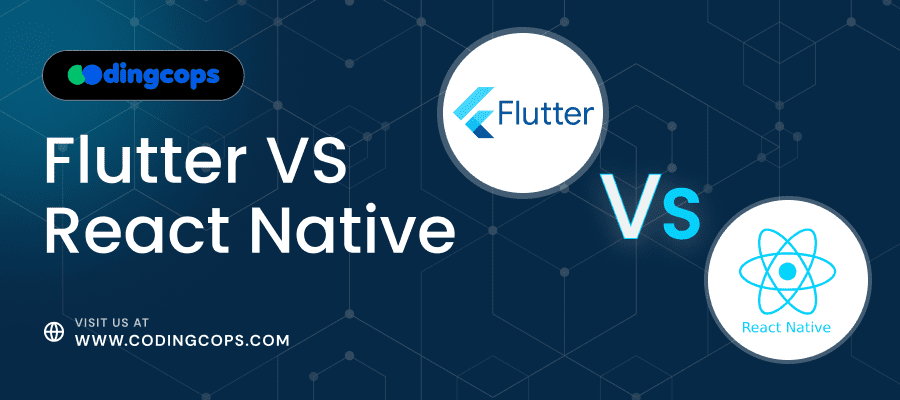When it comes to the app development world, Flutter and React Native are among the two most frequently heard names. As they tend to keep on evolving over time, learning their strong points, vulnerabilities, and important core differences should also be of primary importance for anyone who is willing to undertake a new app development project.
What Is Flutter?

Developed by Google, Flutter is an open-source UI software development kit introduced in 2017. Unlike Java and C# which prioritizes compilation and codebase duplication, Dart tries to allow developers to build apps for mobile, web, and desktop from a single and native codebase.
Advantages of Flutter
- Flutter’s greatest strength lies in its high performance. Applications built with Flutter are compiled to native machine code, which ensures fast and reliable execution across platforms.
- Flutter also provides a package of customizable widgets that allows developers to design UI fairly easily, even if it is more complex and customizable. Its slide-in functionality designed for all platforms enables uniformity of content.
- Hot reload features significantly speed up the development process by allowing instant viewing of changes without needing a full app restart.
- The company Flutter being an ally of Google, has an actively expanding ecosystem and community as well and it provides a rich library, toolset, and resources to its developers.
Disadvantages of Flutter
- As far as the size of the Flutter apps is concerned, they tend to be larger than those created with other frameworks. Also, these might be a problem for developers if they want to maximize the download time and the storage usage of users’ devices.
- For developers not familiar with Dart (Flutter’s programming language), there might be a learning curve involved in picking up the technology.
What Is React Native?

React Native, introduced by Facebook in 2015, is an open-source framework that enables developers to build mobile applications using JavaScript and React. It works by actually leveraging web development experience for mobile app development.
Advantages of React Native
- Being one of the earliest cross-platform frameworks, React Native has a vast and active community. The developers are capable of using many libraries, tools, and resources.
- React Native supports a great extent of code reuse between natively iOS and Android which significantly cuts down the development time and the expenses.
- The framework supports live and hot reloading, making it easier to test changes in real-time without restarting the app.
- React Native functionally involves third-party plugins, resulting in more flexible access to device functionalities and hence less necessity to depend heavily on the browser.
Disadvantages of React Native
- While React Native performs well for most applications, it might lag behind native development in terms of performance for more graphics-intensive or computation-heavy apps.
- When you React developers, they often report challenges with navigation in React Native, citing complexity in implementing smooth transitions and handling deep linking.
React Native vs Flutter

1. Programming Language
Flutter
Flutter picks Dart, which is a language previously created by Google to provide a seamless developer experience in app development. What makes Dart so familiar to those who already know Java and C#, is that its syntax in these languages is quite straightforward, however, it is less proficient in the development domain. Among others, Dart has the advantage of being able to compile to native code to have better performance as well as some features that help in optimizing the development of the UI, such as a hot reload feature.
React Native
React Native is written in JavaScript, a programming language that is extremely popular in the world and is easier for many developers to master. This familiarity is a big plus for web developers in their transition to mobile app development, as it aids in a smoother learning curve and the capacity to use the knowledge of JS that is already present. The use of JavaScript in React Native means that the framework can handle big communities and is part of the large developer ecosystem.
2. Performance
Flutter
Flutter offers high performance that closely rivals native app performance. This is because Flutter applications are compiled directly into native machine code, which eliminates any performance bugs related to the bridge between native and non-native components. Flutter’s performance is quite impressive especially when it comes to complex UI motion and transitions where its ability to control every pixel on the screen amazes.
React Native
React Native, while performing well for most applications, occasionally faces challenges with heavy graphics or computation-intensive applications. This is partly due to the JavaScript bridge, which React Native uses to communicate between the native and JavaScript threads. While recent updates and third-party libraries have aimed to mitigate these issues, Flutter generally offers a smoother experience for performance-critical applications.
3. UI Design and Customization
Flutter
Flutter is claimed to be a superior solution with a widget-driven architecture that consists of a huge number of pre-built widgets that are all customizable. With this feature, they can develop sophisticated UIs that can run smoothly on other systems as well. Flutter’s UI design principle provides a much broader level of customization, than building with these ready-made widgets. Thus Flutter offers the developer a much higher degree of designing towards the clients’ needs.
React Native
React Native uses native components, which can result in a UI that feels more native to the platform. However, this can sometimes lead to inconsistencies across iOS and Android if not managed carefully. While React Native also allows for customization and complex UIs, it might require more effort or reliance on third-party libraries compared to Flutter.
4. Community and Ecosystem
Flutter
Nonetheless, Flutter has a fairly rapidly growing community and an ecosystem, even though it has been in existence for a much shorter period than React Native. Google’s support relieves a carefree development process and feature enhancement. The Flutter ecosystem is full of widgets and packages, but it is still stepping up some of the areas compared to the ones already matured in the ecosystem of React Native.
React Native
React Native has been developed over the years and the community is very big and active. It has a wide variety of libraries, tools, and resources within it which makes the identification of solutions to issues that usually happen in the development process easier. The community is large enough to enable third-party plugins and integrations in large numbers, leading to a decisive acceleration of the development process.
5. Development Time and Cost
Flutter
Flutter can lead to slightly longer development times for teams not already familiar with Dart. However, its extensive widget library and the ability to easily create custom widgets can offset this, especially for apps requiring complex, custom UIs.
React Native
React Native may offer shorter development times, particularly for projects that can leverage a significant amount of code reuse across platforms and for teams with strong JavaScript skills. This allows developers to easily integrate web application code into mobile apps and thus saves time and money spent on development.
Conclusion
In the Flutter vs. React Native debate, the choice hinges on specific project requirements, team expertise, and the importance of performance versus rapid development. To put it simply, Flutter is better for applications that require custom UIs and high performance, while React Native is better for development with JavaScript and faster loops. Depending on your organizational or project goal, you can choose the appropriate one.
More Related Blogs
- React vs. Backbone.js
- React Lifecycle Methods
- React State Management Libraries
- Spring Boot Developers




